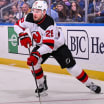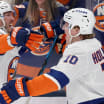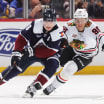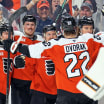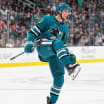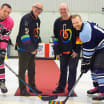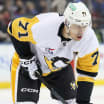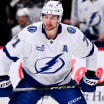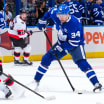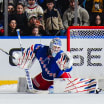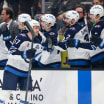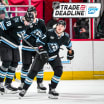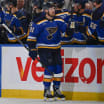Deep into what would be the longest game -- and longest night -- of his professional life, New York Islanders forward
Pat LaFontaine
was approached by referee Andy Van Hellemond moments before the fourth overtime of Game 7 of the 1987 Patrick Division Semifinals.
Pat LaFontaine, others recall 'Easter Epic'
Islanders defeated Capitals 30 years ago in historic Game 7
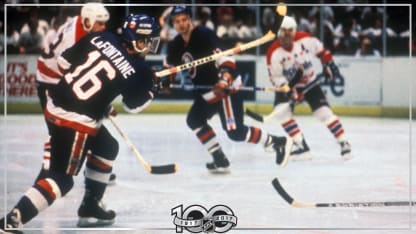
LaFontaine and the Islanders were mystified over what they had to do to solve Washington Capitals goalie Bob Mason since center Bryan Trottier had tied the game 2-2 at 14:37 of the third period. Mason and Islanders goalie Kelly Hrudey were seeing beach balls instead of hockey pucks. The tension inside the Capital Centre was thicker than the humidity gripping Landover, Maryland, the night before Easter, April 18.
Van Hellemond, and apparently only Van Hellemond, had a secret, asking LaFontaine in jest, "Would you just shoot high glove and get this over with?"
A long, strange game finally reached its conclusion when Van Hellemond's advice proved prophetic. LaFontaine beat Mason -- high glove -- at 8:47 of the fourth overtime for a 3-2 victory at 1:58 a.m. ET on April 19, Easter morning, 6 hours and 18 minutes after the opening faceoff.
"I didn't think anything of it, but when I look back at it, I shot it," LaFontaine said. "I was just shooting the puck hoping it would go in. It ended up going high glove. I laughed about it years later."
Van Hellemond retrieved the puck and gave it to LaFontaine as a memento. It was personalized with the time of the goal and final score, and placed into a wooden plaque along with the scoresheet. LaFontaine owns it to this day, a keepsake from the "Easter Epic." The Hockey Hall of Fame member went down in history as the hero, but there were others. Hrudey finished with 73 saves, a Stanley Cup Playoff record. Mason had 54, 36 in the overtimes, but could not prevent the Capitals from blowing a 3-1 series lead or a game they never trailed until the end.
Thirty years later, the "Easter Epic" remains the longest Game 7 in NHL history, the 10th longest game overall and a talking point seemingly every spring.
"It was such an emotional game and exciting game," Hrudey said. "You kind of had the feeling that nobody was going to be the goat. I don't think anybody on the management side of either team was going to be disappointed with their group after playing multiple overtimes."
After New York and Washington split the first two games in Landover, the Capitals won Games 3 and 4 at Nassau Coliseum to put the Islanders in a precarious yet familiar position. No team had won a series after trailing 3-1 in 12 years, since New York came back from down 3-0 to defeat the Pittsburgh Penguins in the 1975 quarterfinals. In 1985, the Islanders became the first team to win a best-of-5 series after trailing 2-0 in the Patrick Division Semifinals -- against the Capitals.
"There was an overcome attitude of don't let the highs get too high and the lows get too low," LaFontaine said. "We had some history and we had some championship players in the room. I think they were a great balancing factor of that team that it helped allow us to keep an even head and keep the focus on winning one game at a time, which we did."
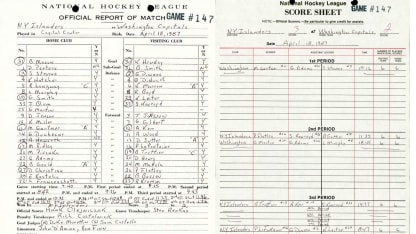
After the Islanders tied the series 3-3, they faced a daunting challenge in Game 7. Forwards Mike Bossy and defenseman Denis Potvin -- two cornerstones of the Islanders' four consecutive Stanley Cup-winning teams from 1980-1983 -- were out because of injuries. Trottier, who at age 30 led the Islanders with 87 points (23 goals, 64 assists) in the regular season, was playing with a separated shoulder.
"That made the climb much more difficult," LaFontaine said. "We looked at it as not one big mountain but some smaller hills. We were able to get to Game 7 so we realized this team has evolved and grown, and now you're missing some of your key leaders and past Stanley Cup champions, and it was almost like the torch was being passed to a certain extent."
The Capitals dominated the first period before Mike Gartner beat Hrudey at 19:12 for a 1-0 lead. Washington took a 2-1 lead into the third, having outshot New York 25-10, before Trottier's tying goal gave the Islanders new life.
Little did anyone realize Game 7 was not even halfway over.
"Nobody had a clue," LaFontaine said. "That first overtime period was probably the grittiest, guttiest … all out every shift. I must have taken 50 faceoffs because I had bruises all up and down my wrist. Once we got to the third, fourth overtime, it seemed like we were only able to give it all out for about 5-8 minutes. Then you went into kind of this automatic pilot [mode]."
Players resorted to eating bananas and oranges, drinking Gatorade and salt water, and changing their underwear between periods. The experience was especially taxing on the goaltenders, who, unlike the skaters, were on their feet without the luxury of sitting on the bench between shifts, and players on each side were wondering whether the game would ever end.
"During certain times when we were on the attack I'm thinking we're going to get one," Mason said. "We hit two or three pipes throughout the overtimes. Every little play at the net is a potential goal. You're kind of watching a little bit when the puck's at the other end and thinking, 'This could be it. We're going to win this game.' You're just focusing on that puck when they're down at your end.
"It was suspenseful. I think the fans were into it. I don't think anybody left. It was certainly a suspenseful Game 7, no doubt."
A little more than halfway through the fourth overtime, the theme from "The Twilight Zone" blared over the speakers while LaFontaine felt a splash of water down the back of his neck. It was from Islanders equipment manager Jim Pickard, who told him, "Pop, I think you're going to get one on this shift." Thirty seconds later, LaFontaine was on the ice when Islanders defenseman Gord Dineen circled the net and had his shot blocked by Capitals defenseman Kevin Hatcher. The puck was deflected to LaFontaine, who was covering for Dineen inside the blue line, and he spun 180 degrees to shoot the puck on net. Standing in front of Mason was Islanders forward Dale Henry, in the right place at the right time.
Mason was finally beaten. He fell to his knees in disbelief.
"It was a broken play," Mason said. "I look at it now and go, 'God, was I deep in my net?' I was sitting at the goal line. It was a quick shot and I think I was trying to find the puck. I didn't see it, screen, went through a couple of players, post and in."
Television cameras didn't catch Hrudey's reaction, but he says it took about three seconds to sink in that the game was over. To this day he's appreciative of Henry; if not for his screen, who knows when the game would have ended.
"He had an incredible part in that goal," Hrudey said, "and most people would not remember that he was on the ice."
When Hrudey took off his skates 10 minutes after the game, he was so dehydrated his toes immediately curled under. Islanders forward Clark Gillies told LaFontaine he lost 12 pounds of fluid. Mason said he lost about 15 pounds and felt like he had a hangover the next morning.
"That's when it really kind of hit me the next day when I woke up," he said. "It felt like I hit a truck."
Next for the Islanders were the Philadelphia Flyers, the Patrick Division champions, in the division final. The Islanders arrived at Nassau Coliseum from LaGuardia Airport at 7 a.m. Easter morning. Some players got home at 8 a.m., took a nap and went to Mass.
By 6 p.m., the Islanders were headed back to the Coliseum to board a bus to Philadelphia for Game 1 the next night. Once again the Islanders fell behind 3-1, and yet again they rallied to tie the series. This time there would be no miracle. The Flyers defeated the Islanders 5-1 in Game 7 and ultimately advanced to the Stanley Cup Final, where they lost to the Edmonton Oilers.
Mason signed with the Chicago Blackhawks as a free agent in the offseason and played four more seasons before retiring in 1991. He has been goaltending coach of the Minnesota Wild since 2002.
"The most disappointing thing is that we were up 3-1," Mason said. "We kind of had control of that series. I guess you never control a series until the fat lady sings."
Hrudey was traded to the Los Angeles Kings in 1989 and was their starting goalie during the 1993 Cup Final against the Montreal Canadiens. He works for Sportsnet as a TV analyst for "Hockey Night in Canada" and the Calgary Flames.
"Personally, that game and that series changed my reputation to a certain degree," Hrudey said. "I became a guy who was thought of more as a real big-game goalie and a starter."
LaFontaine, the NHL's vice president for hockey development and community affairs, played for the Islanders until 1991 and finished his NHL career with 1,013 points (468 goals, 545 assists) in 865 games for the Islanders, Buffalo Sabres and Rangers. He was inducted into the Hockey Hall of Fame in 2003 and in January was named one of the 100 Greatest NHL Players presented by Molson Canadian.
"I learned a lot," said LaFontaine, who will celebrate his 30th wedding anniversary on June 6. "I think I was able to then take that experience and those experiences with those players and try to bring your game to the next level. That was definitely a steppingstone, that year, that team and that moment. When people talk about it they kind of light up in a way that, 'Hey! You know where I was? You know what I was doing?' Yeah, it's fun to still talk about it."

